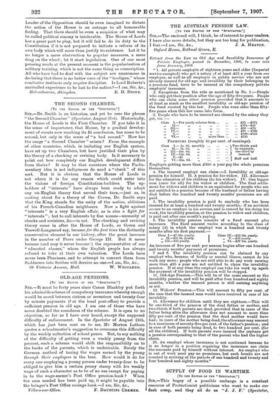THE SECOND CHAMBER
[To THE EDITOR OF THE -Brzoreion.."]
SIR,—Dr. Smith is an historian, and yet he uses the phrase "the Second Chamber" (Spectator, August 31st). Historically, the House of Lords is the First Chamber. If you take it in the sense of importance, that House, by a gradual develop- ment of events now reaching its fit conclusion, has come to be second, but only in the sense of "a bad second." How has the usage "a Second Chamber" arisen ? From the example of other countries, which, in imitating our E4ish system, have set up two Chambers, but have justified their plan by the theory of a checking or revising body. Is it necessary to point out how completely our English development differs from theirs ? It may be that countries where the Parlia- mentary idea is not indigenous do need a "check" of this • sort. But it is obvious that the House of Lords is not where it is for any reason which could enter into the visions of foreign Constitution-builders. The' up- • holders of "interests" have always been ready to adopt any un-English theory that served their turn,—just as, in casting about for a theory of the Crown, Dr. Smith says that the King stands for the unity of the nation, oblivious of his French-Canadian neighbours. Now a fight against " interests " is a very English affair, as is also a fight for " interests " ; but to call interests by fine names—necessity of • checks and revisions, &c.—is not. The checking and revising theory came in after the House of Lords, as Green and Taswell-Langmead say, became for the first time the distinctly conservative element in our history, after the great increase in the number of Peers under George III. But it never became (and may it never become !) the representative of our "educated classes," whom the English people has always refused to take at their own valuation. The Lords have never been Pharisees, and to attempt to convert them from SmIducees into Scribes will deceive no one.—I am, Sir, &c.,






































 Previous page
Previous page